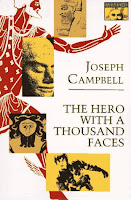
As I was reading this chapter, I began thinking about the difference between my step-father and biological father. Between the two, Dad at first seems the hero as he is the one who travels, changes jobs, and frequently introduces me to new step-mothers [I've had five]. But when I thought about his life some more, I realized that he really wasn't symbolically dying and being reborn during these changes, that he made the changes instead to fix and secure his comfortable life. For example, he was married to Laurie for seven or so years. They worked together in a small successful business my father started; they traveled, ate out, shopped, and watched a lot of TV. Laurie was unhappy despite having the money to do as she pleased and started gambling online. She managed to keep this fact hidden for a short time only, as credit card bills began rolling in. Rather than commit to the relationship or try to get her help, my father paid off the gambling debt and divorced her. He didn't want the complications of a "mental patient." He was married anew within a year to Angie, who likes to put in a few hours with him at the office, eat out, shop, and watch a lot of TV.
My step-father is not as worldly as my dad. A cowboy from Arizona, he did a stint as a cook in the Navy and managed warehouses most of his life. When he retired, he took up golf even though nothing in his upbringing prepared him either for the skill of that sport or the social graces to maneuver successfully at country clubs. None of that stopped him, however. He played with people who were way better at getting that little ball in the little hole, who were more educated, had way more money, and probably thought of him—at first—as a comical redneck. Eventually, his game improved and he made real friends with his golf buddies, who quit thinking of him as the foursome's bumpkin. When he couldn't stand the pain in his knee any longer, he had replacement surgery so that he could get back out on the courses. His greatest source of joy is volunteering at big-deal tournaments and hobnobbing with his golf heroes. He was willing to learn, willing to set aside the old ways of doing something to experience something new. He is more a hero in the Campbell sense of the word than my biological father.


